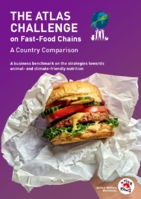
International Fast-food Chains
How do the headquarters of key international fast-food chains compare to their locations in other countries?
Consumer concerns surrounding sustainability, health, animal welfare, and the climate are helping drive the demand for more plant-based foods and, as a result, are pushing the food industry to diversify their menus and reevaluate their meat and plant-based options.
To see where some of the top companies in the global fast-food industry stand in their meat reduction strategies and their plant-based progress, FOUR PAWS contacted the headquarters of 11 key international fast-food chains* and included the countries where these chains had the highest number of locations. The company’s level of effort and performance on their innovative food strategies for meat and fish-based substitutes were also assessed and scored. In addition, we reviewed how chains compared to each other in different countries, since the same fast-food chain can differ in its corporate social responsibility (CSR) policies, product range, marketing tactics, and future commitments depending on the country it is in.
Overall, we wanted to know: Are these companies taking the necessary steps to reduce the amount of meat and fish products offered to play their part in climate mitigation and are they stepping up their game to increase plant-based foods and other innovative meat and fish alternatives?
See how your favorite fast-food chain compares to the rest!
*The key fast-food chains were selected from the previous fast-food chain ranking focused on Europe and the United Kingdom conducted by FOUR PAWS and launched in March 2021.
*Abbreviation for Canada (CA), China (CN), Guatemala (GT), India (IN), United States (US), & South Africa (ZA)
The Atlas Challenge ranking is based on FOUR PAWS’ assessment based on publicly available information researched between May and October of 2021. The ranking provides an overview of the fast-food chains’ efforts when it comes to progressive food strategies, along with which chains’ support meat and fish reduction as well as the increase of plant-based foods and other innovative plant-based substitutes. The reduction of meat products and an increase in plant-based alternatives are crucial to decreasing animal suffering on factory farms and lowering greenhouse gas emissions generated by the intensive animal farming industry.
For more information click here.
Note: Any advertisements that may appear during the viewing of this video are unrelated to FOUR PAWS. We assume no liability for this content.
did you know?
- Plant-based foods are a booming business. The increase in plant-based meat and fish substitutes is largely driven by flexitarians, who are people that still eat meat and dairy but are striving to reduce their consumption of both.1
- Plant-based fish is one of the most lucrative plant-based food categories of the future.2
- 77% of agricultural land is used for livestock to produce meat and dairy, including grazing land and arable land for feed production; only 23% are used for crops.3
- More antibiotics are given to farm animals than to humans, accelerating antibiotic resistance in humans.4
- China consumes 28% of the world’s meat, including half the world’s pork, but plant-based meat substitutes are infiltrating the market due to increasing consumer demand.5
- Europe’s largest vegan accreditation program (V-Label) has now been introduced to the South African market, boosting plant-based meat sales.6
- Beyond Meat and Impossible Foods are two of the leading players in the U.S. plant-based food market who have partnered with a number of fast-food chains nationally and globally.7
- 95% of the people who bought a plant-based burger in 2019 were meat eaters.8
- According to recent Google search, Beyond Meat is the world’s most Googled vegan food brand.9
Source
2. https://www.independent.co.uk/life-style/food-and-drink/vegan-burgers-leon-veganuary-plant-based-meal-food-a9294046.html
3. Land Use - Our World in Data
4. 10 things you should know about industrial farming (unep.org)
5. https://www.theguardian.com/world/2021/mar/09/chinas-appetite-for-meat-fades-as-vegan-revolution-takes-hold
6. https://www.capetalk.co.za/articles/427515/south-africa-s-plant-based-food-industry-is-beginning-to-bloom
7. https://uproxx.com/life/fast-food-chains-serving-plant-based-meat-2021/
8. https://www.huffpost.com/entry/eat-less-meat-environmental-effect_l_5d39d84fe4b020cd99501f2d
9. FNB News - The most Googled vegan brands in the world – Beyond Meat is most searched | FNB News

















